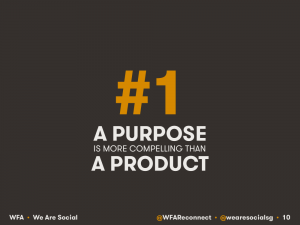 Purpose isn’t about saving the planet (although it can be). Marketers should take a wider view of the power of purpose, suggests Will Gilroy.
Purpose isn’t about saving the planet (although it can be). Marketers should take a wider view of the power of purpose, suggests Will Gilroy.
When marketers think about purpose and the brands that epitomize it, they often just see half the picture.
They rightly look at brands such as Dove, TOMS Shoes, The Body Shop and Patagonia for inspiration. But while these are clearly purposeful brands, they only represent part of what purpose is about.
We’ve been researching what purpose means to brand marketers for a few years now. Our latest findings can be seen here.
Edelman does the same with consumers. Their Good Purpose research tracks consumer views about what makes for a purposeful brand.
Purpose need not be worthy
The Edelman data certainly tell us that purpose is important to consumers. 36% globally say they buy a brand that supports good causes at least once a month. And the WFA’s research shows that 87% of marketers think it’s important for brands to have a sense of purpose.
But the Edelman research tells us that purpose is much more than saving the planet. It may sound plain and intuitive but people don’t think, “what’s that company’s purpose?’. They just like some companies more than others.
And while that impression may be impacted by lofty ambitions to save whales or impact climate change, more often than not it’s about providing decent customer service and doing the right thing by immediate stakeholders, such as employees, suppliers and local communities.
Marketers tend to equate purpose with trying to positively impact communities, improving the environment and ethical business activities. Consumers say the top attribute is the ability to listen to and respond to customer needs and feedback. The next most important attribute that builds trust is high quality products and services, with treating employees well coming in at No 3.
People globally seek purpose. It’s not just a Western thing
Critically, these are not just developed market concerns for consumers in North America and Western Europe. The Edelman research shows how they are particularly relevant for developing markets, where the impact of unethical behaviour often falls heaviest or where people live in closer proximity to poverty on a daily basis.
China, India and Brazil all scored significantly higher than the global average when consumers were asked if they would pay a premium for a product that supports good causes, for example.
The wider view of purpose expressed by consumers opens the doors for brands and marketers to take purpose in new directions. Eighty-nine percent of marketers recognize that purpose needs to pervade the entire organization and have buy-in from all business functions.
Purpose, as powerful internally as externally
Critically, purpose gives companies a chance to motivate and attract talent. A company with purpose is clearly a more attractive proposition in an industry where the very best can pick and choose who they work for.
We’ve had a number of WFA members recently come to us to talk about how purpose can be used internally to inspire and motivate their workforce. Companies are looking at new ways of unlocking the potential of corporate or brand purpose to galvanise employees and put a spring in their step.
The other side of purpose is its power to open internal doors to the marketing department. If purpose is about doing the right thing, behaving well and responding to customer questions, then marketing needs to kick off the dialogue with all these different areas.
Purpose puts marketing at the heart of the operational business of the company and allows it to build bridges with these departments, ensuring that what’s said in public matches what’s being done in private.
At Unilever, CMO Keith Weed is also responsible for leading the company’s sustainability agenda, further evidence that marketers are increasingly reaching beyond their TV, digital and outdoor messages to create meaningful dialogues that reflect every aspect of their company.
The truth about purpose is that too many companies focus on just one aspect of it, when it can deliver so much more.
We want to hear your views. Tell us what you think @WFAReconnect
About Project Reconnect
Launched in 2010 by the World Federation of Advertisers, Project Reconnect is an initiative that aims to develop a better understanding of what people want and expect from brands. We believe that the most successful brands in the future will be those that listen hardest to what people have to say and respond best to what people want. Read more here.

